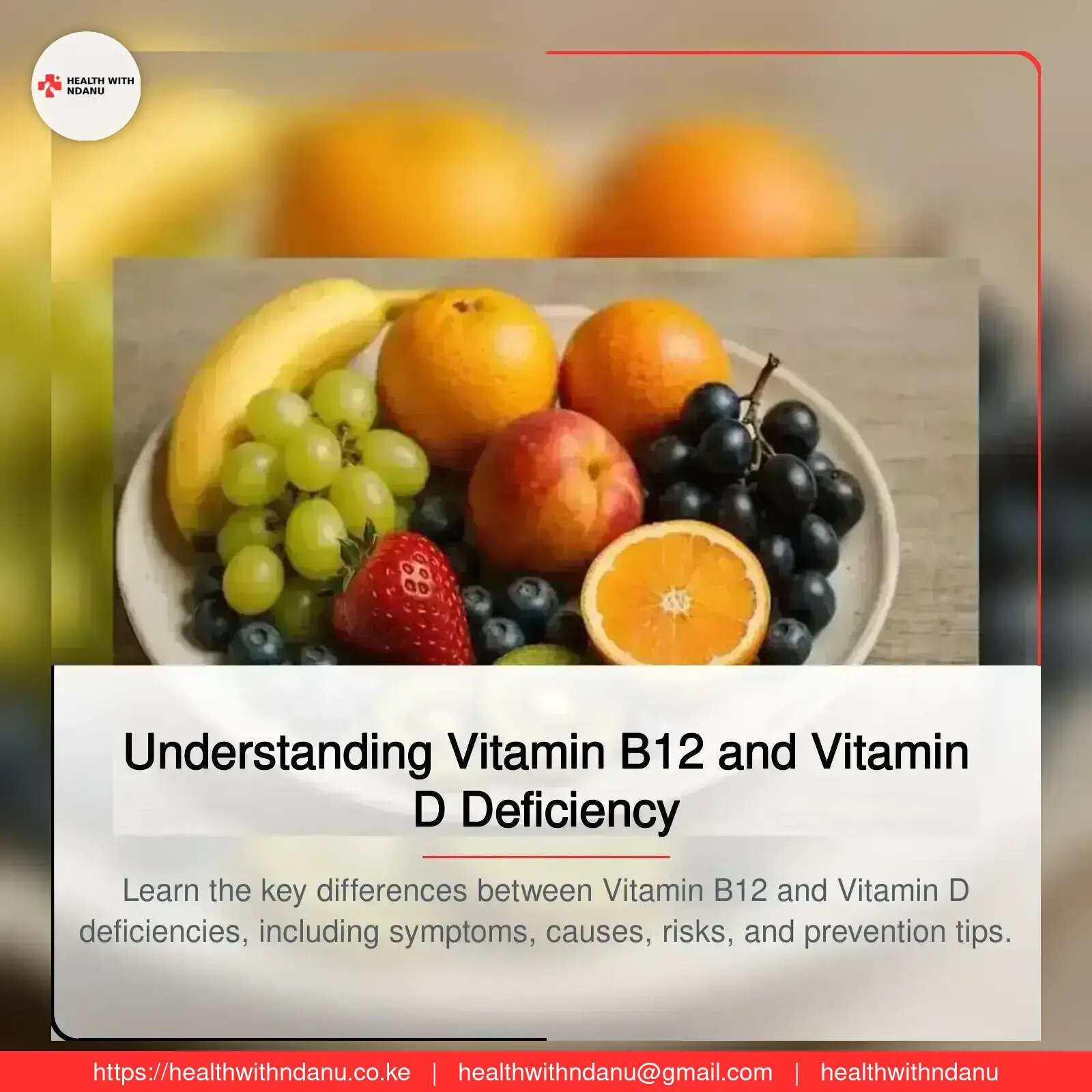Understanding Vitamin B12 and Vitamin D Deficiency



Introduction
In today’s fast-paced world, more people are becoming aware of how critical proper nutrition is for overall health. Among the most common deficiencies globally are Vitamin B12 deficiency and Vitamin D deficiency. While both are essential nutrients that play vital roles in maintaining health, they differ significantly in their functions, causes, symptoms, and consequences when absent in the body. Understanding these differences is crucial for preventing chronic health issues and promoting well-being.
What Are Vitamins and Why Are They Important?
Vitamins are organic compounds that the body needs in small amounts to function correctly. They support many bodily processes, including metabolism, immunity, bone health, energy production, and neurological functions. Since most vitamins cannot be produced sufficiently by the body, we rely on food or supplements to meet our needs.
When the body lacks essential vitamins like B12 or D, it can lead to serious health problems. Unfortunately, many people remain unaware of the silent damage caused by these deficiencies until symptoms become severe.
Let’s dive into the details of Vitamin B12 and Vitamin D, understanding their individual importance, the effects of deficiency, and how you can prevent them.
What is Vitamin B12?
The Role of Vitamin B12
Vitamin B12, also known as cobalamin, is a water-soluble vitamin crucial for:
- Red blood cell formation
- DNA synthesis
- Proper neurological functioning
- Energy production
- Maintaining healthy nerve cells
Vitamin B12 is mainly found in animal products such as meat, dairy, eggs, fish, and fortified cereals. It plays a particularly vital role in the production of red blood cells and the myelin sheath, the protective covering around nerves.
Causes of Vitamin B12 Deficiency
B12 deficiency occurs when the body either does not receive enough B12 or cannot absorb it properly. Common causes include:
- Poor dietary intake: Especially in vegetarians and vegans since plant-based foods lack B12.
- Pernicious anemia: An autoimmune condition where the body cannot absorb B12 due to a lack of intrinsic factor (a protein necessary for absorption).
- Gastrointestinal issues: Conditions like Crohn’s disease, celiac disease, or surgeries that remove parts of the stomach or intestines.
- Medications: Long-term use of proton pump inhibitors or metformin may affect B12 absorption.
- Aging: Older adults often have reduced stomach acid, which affects B12 absorption.
Symptoms of Vitamin B12 Deficiency
- A deficiency in Vitamin B12 may present with:
- Fatigue and weakness
- Pale or jaundiced skin
- Shortness of breath
- Numbness and tingling (especially in hands and feet)
- Poor balance or coordination
- Cognitive disturbances (memory loss, confusion)
- Depression or mood changes
- Glossitis (inflamed tongue) and mouth ulcers
Long-Term Dangers of Vitamin B12 Deficiency
Without treatment, prolonged B12 deficiency can lead to:
- Permanent nerve damage
- Severe anemia (megaloblastic anemia)
- Neurological impairments (irreversible if prolonged)
- Increased risk of heart disease due to elevated homocysteine levels
- Developmental delays in children
What is Vitamin D?
The Role of Vitamin D
Vitamin D, often called the “sunshine vitamin,” is a fat-soluble vitamin critical for:
- Calcium absorption
- Bone mineralization and strength
- Immune system regulation
- Inflammation reduction
- Muscle function
The body can synthesize Vitamin D when the skin is exposed to sunlight (UVB rays). It is also found in fatty fish, egg yolks, fortified dairy products, and supplements.
Causes of Vitamin D Deficiency
- Vitamin D deficiency is widespread and can result from:
- Limited sun exposure: Spending too much time indoors or living in areas with little sunlight.
- Dark skin: Higher melanin levels reduce the skin’s ability to produce Vitamin D.
- Obesity: Vitamin D is sequestered in fat tissue, lowering bioavailability.
- Liver and kidney disorders: These organs are essential for converting Vitamin D into its active form.
- Dietary insufficiency: Poor intake of Vitamin D-rich foods.
- Malabsorption syndromes: Conditions like celiac disease or inflammatory bowel disease.
Symptoms of Vitamin D Deficiency
Signs of Vitamin D deficiency include:
- Bone pain and muscle weakness
- Frequent infections (weakened immunity)
- Fatigue and tiredness
- Depression or mood disorders
- Slow wound healing
- Hair loss
- Joint pain
- In children, it can lead to rickets (soft, weak bones) and growth delays.
Long-Term Dangers of Vitamin D Deficiency
Chronic Vitamin D deficiency increases the risk of:
- Osteomalacia (soft bones) in adults
- Osteoporosis: Weak, brittle bones that are prone to fractures
- Autoimmune diseases (e.g., multiple sclerosis, rheumatoid arthritis)
- Cardiovascular disease
- Type 2 diabetes
- Severe respiratory infections (e.g., increased risk of flu or pneumonia)
- Poor mental health outcomes (increased anxiety and depression)
Key Differences Between Vitamin B12 and Vitamin D Deficiency
Why Are These Deficiencies Often Overlooked?
Both Vitamin B12 and Vitamin D deficiencies are termed “silent epidemics” because symptoms may develop slowly and mimic other health conditions. Fatigue, depression, and cognitive problems can be mistaken for stress, mental health disorders, or aging. As a result, many people go undiagnosed for years, allowing irreversible damage to occur.
Routine blood tests can detect low levels of these vitamins, but many healthcare systems do not regularly screen for them unless specific symptoms or risk factors are present.
The Importance of Early Detection and Treatment
For Vitamin B12:
- Deficiency is typically treated with oral supplements or B12 injections, depending on severity.
- In people with absorption issues, injections or sublingual B12 may be necessary.
- Addressing underlying causes, such as treating pernicious anemia or improving gut health, is crucial.
For Vitamin D:
- Deficiency can be corrected with Vitamin D3 supplements (cholecalciferol).
- Lifestyle adjustments like increased safe sun exposure and improved diet help maintain healthy levels.
- In severe cases, high-dose supplementation under medical supervision may be required.
Prevention Tips for Both Deficiencies
1. Balanced Diet: Include Vitamin B12-rich foods like fish, poultry, dairy, and fortified cereals. Add Vitamin D sources like salmon, tuna, eggs, and fortified milk.
2. Sun Exposure: Aim for 10-30 minutes of sun exposure on the face, arms, and legs at least 2-3 times a week, depending on your skin tone and location.
3. Regular Screening: If you’re at risk (vegan, elderly, have chronic illnesses, or limited sun exposure), ask your healthcare provider for vitamin level testing.
4. Supplementation: When diet or sunlight is insufficient, supplements can bridge the gap. Choose high-quality supplements as recommended by a healthcare professional.
5. Gut Health: Conditions like celiac disease or IBS can impair nutrient absorption. Managing these conditions supports better vitamin absorption.
The Broader Picture: Vitamin Deficiencies and Public Health
Globally, micronutrient deficiencies, also known as hidden hunger, affect millions. Vitamin B12 and D deficiencies contribute significantly to preventable diseases, especially in aging populations, people with chronic illnesses, and those following restrictive diets.
The dangers of these deficiencies go beyond individual health—they place a heavy burden on healthcare systems due to increased rates of fractures, cardiovascular disease, neurodegenerative disorders, and mental health issues.
Raising Awareness
Educating people about the importance of vitamins through public health campaigns, schools, and healthcare providers is vital. Simple steps like reading food labels, getting outside more, and scheduling regular health checkups can dramatically reduce the incidence of these deficiencies.
Final Thoughts
While Vitamin B12 and Vitamin D deficiencies share some overlapping symptoms like fatigue and mood changes, they arise from different causes and lead to distinct long-term health problems if left untreated. The key is understanding your unique risk factors and taking proactive steps to safeguard your health.
In our modern world, where dietary habits and sedentary lifestyles often contribute to nutrient gaps, addressing deficiencies early could mean the difference between a life of vitality and one marred by chronic illness.
Remember: Prevention is always easier—and cheaper—than treatment.
Una uzoefu wako? Shiriki nasi
Kategoria Maarufu
Blogu Zinazotembelewa Zaidi
Daily Newsletter
Get all the top stories from Blogs to keep track.



